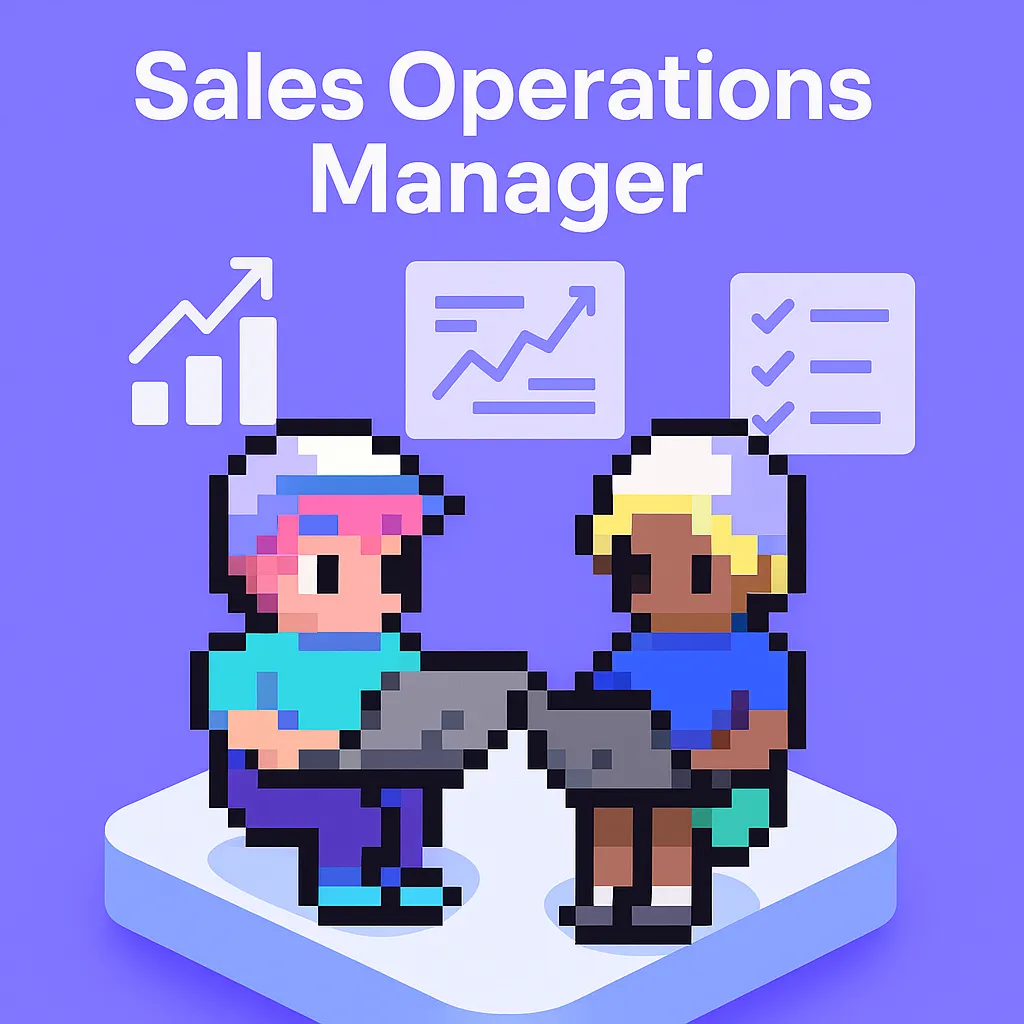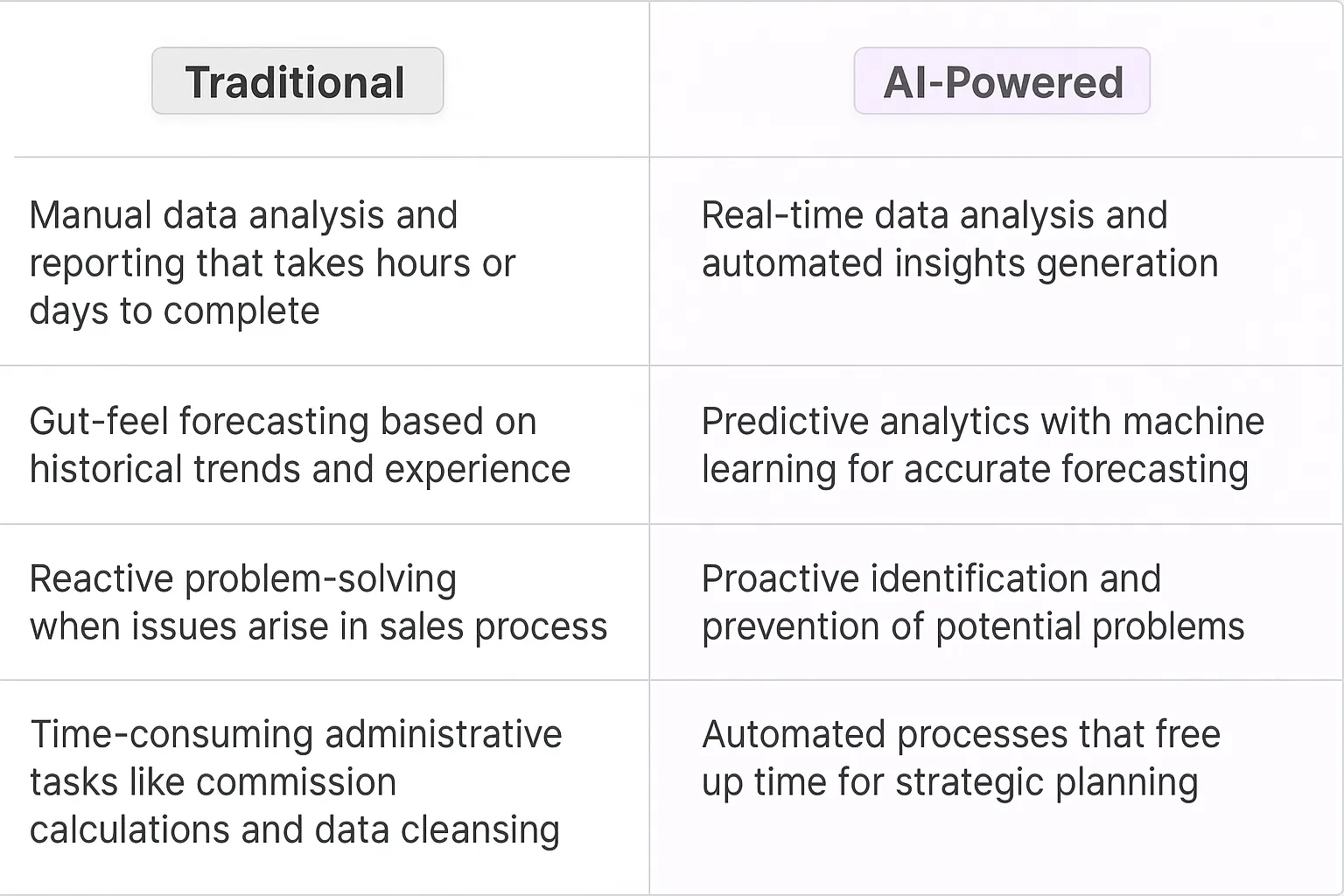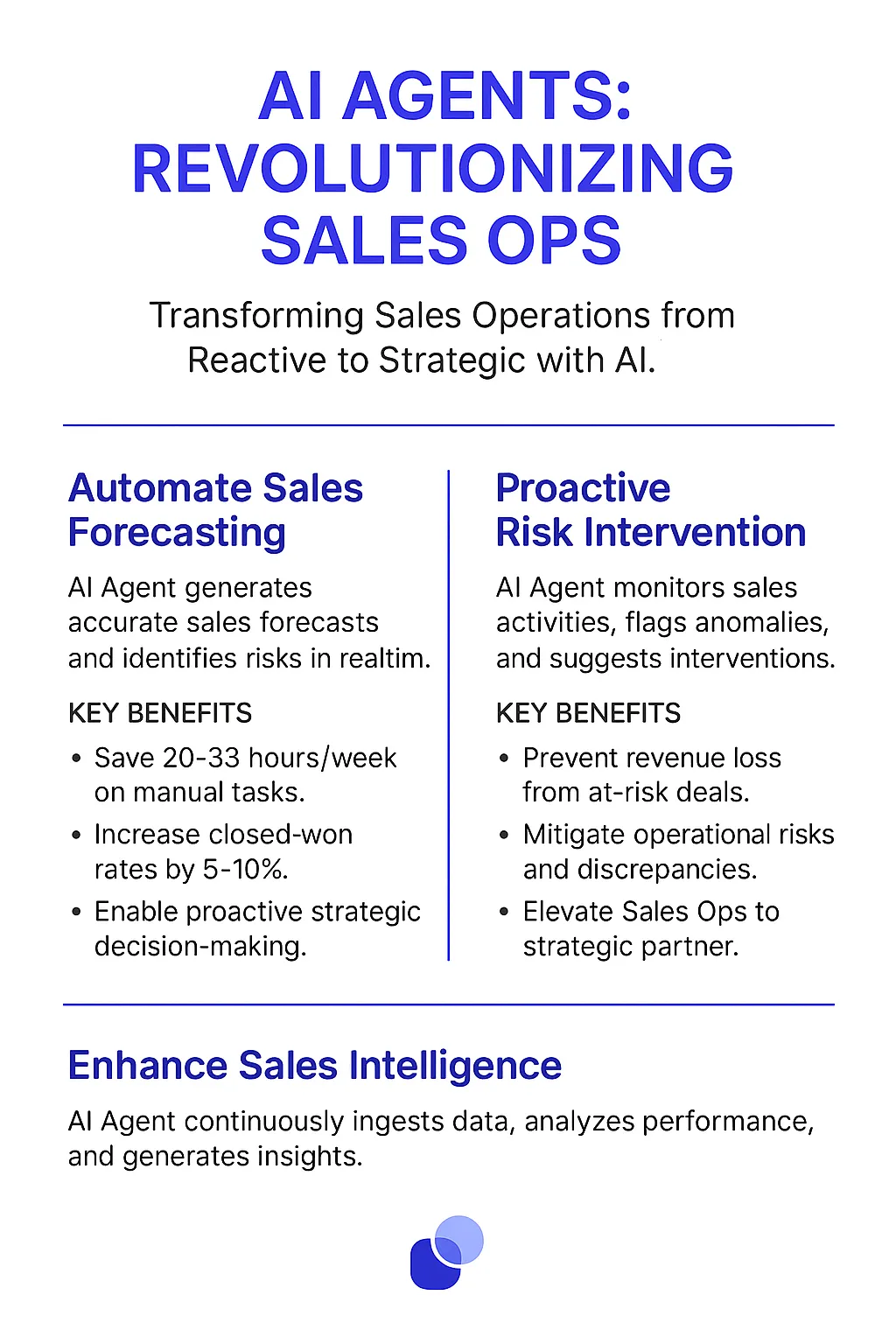Sales Operations Manager is a critical role that bridges the gap between sales strategy and execution. These professionals are responsible for optimizing sales processes, analyzing performance data, and implementing tools and strategies to drive revenue growth. They're the behind-the-scenes architects of a company's sales success, ensuring that the sales team has the resources, data, and support needed to close deals effectively.
The key features of a Sales Operations Manager's role include:1. Data Analysis: Crunching numbers to uncover insights and trends in sales performance.2. Process Optimization: Streamlining sales workflows to maximize efficiency and effectiveness.3. Forecasting: Predicting future sales trends and revenue based on historical data and market conditions.4. Technology Implementation: Selecting and deploying sales tools and CRM systems to enhance team performance.5. Performance Tracking: Monitoring KPIs and adjusting strategies to meet sales targets.6. Cross-functional Collaboration: Working with marketing, finance, and product teams to align sales efforts with broader business goals.

Before AI agents entered the scene, sales ops managers were drowning in a sea of spreadsheets, CRM data, and endless email threads. They'd spend countless hours manually crunching numbers, reconciling data discrepancies, and playing email tag with sales reps to get status updates. It was like trying to conduct an orchestra where every musician was playing a different song.
The tools of the trade were clunky dashboards that required constant updating, static reports that were outdated the moment they were generated, and gut instincts honed through years of experience. But in the fast-moving world of sales, these methods were like bringing a knife to a gunfight.
Enter AI agents - the secret weapon that's giving sales ops managers superpowers. These digital teammates are like having a team of data scientists, analysts, and psychics working 24/7 to optimize your sales process.
First off, AI agents are crushing the data game. They're ingesting and analyzing vast amounts of data in real-time, spotting patterns and insights that would take a human months to uncover. This means sales ops managers can make decisions based on up-to-the-minute information, not last quarter's stale reports.
But it's not just about number crunching. These AI agents are getting scary good at predicting the future. They're forecasting sales with uncanny accuracy, flagging deals that are at risk of slipping, and even suggesting the best times to follow up with prospects. It's like having a crystal ball, but one that's powered by algorithms instead of mystical energy.
Perhaps the most game-changing benefit is how AI agents are freeing up sales ops managers to focus on strategy. Instead of getting bogged down in administrative tasks, they can now spend their time on high-level thinking and planning. It's like suddenly having an army of assistants handling all the grunt work, leaving you free to plot world domination (or at least, sales domination).
And let's talk about personalization. AI agents are enabling a level of customization in sales outreach that was previously impossible at scale. They're tailoring messaging, recommending products, and even adjusting pricing strategies based on individual customer data. It's like having a personal shopper for every single prospect in your pipeline.
The bottom line? AI agents are turning sales ops managers from data wranglers into strategic visionaries. They're not just improving efficiency; they're fundamentally changing the game. In the arms race of sales, AI agents are the nuclear option. And the sales teams that aren't adopting them? Well, they're bringing spreadsheets to a machine learning fight.

Sales ops managers, listen up. AI agents are about to become your secret weapon in the never-ending battle for efficiency and growth. These digital teammates can tackle the complex, data-heavy processes that often bog down your team. Think of them as your personal army of analysts, working 24/7 to optimize your sales machine.
One killer application? Sales forecasting. AI agents can crunch through historical data, market trends, and real-time pipeline information to generate frighteningly accurate predictions. They'll spot patterns humans might miss, giving you a crystal ball into future revenue. This isn't just incremental improvement - it's like going from a paper map to GPS overnight.
Territory planning and quota setting are other areas ripe for AI disruption. These digital teammates can analyze performance data, market potential, and competitive landscapes to suggest optimal territory divisions and realistic yet challenging quotas. Say goodbye to the days of gut-feel decisions and hello to data-driven precision.
On the task level, AI agents are poised to revolutionize how sales ops managers handle their day-to-day grind. Let's break it down:
Data cleansing and enrichment? Consider it done. AI agents can tirelessly scrub your CRM, filling in missing fields, correcting errors, and enriching records with valuable external data. This isn't just about having a tidy database - it's about arming your sales team with the sharpest intel possible.
Commission calculations, the bane of many sales ops managers' existence, can be automated to near perfection. AI agents can handle complex rule sets, tiered structures, and special incentives without breaking a sweat. They'll catch errors that humans might miss, ensuring your sales team stays motivated and fairly compensated.
Report generation? That's child's play for these digital teammates. They can pull data from multiple sources, create visually compelling dashboards, and even write insightful summaries of key trends. Imagine walking into your next executive meeting with a comprehensive sales analysis that practically wrote itself.
But here's where it gets really interesting: AI agents can start to predict and prevent problems before they occur. They might flag a deal that's showing signs of stalling, identify a rep who's at risk of missing quota, or spot a territory that's underperforming. This proactive approach allows sales ops managers to shift from firefighting to strategic planning.
The bottom line? AI agents are set to transform the role of sales operations managers. They're not replacing human judgment - they're augmenting it, allowing you to focus on high-level strategy while they handle the heavy lifting. The sales ops managers who embrace this technology will find themselves with a massive competitive advantage. Those who don't? Well, they might just find themselves obsolete.

AI agents are reshaping the landscape for Sales Operations Managers across diverse industries. These digital teammates aren't just tools; they're game-changers that amplify human capabilities and drive results. Let's dive into some concrete, industry-specific scenarios where AI agents are making waves in sales ops:
In tech, AI agents are crunching massive datasets to uncover hidden patterns in customer behavior. They're not just spitting out numbers; they're providing actionable insights that help sales teams tailor their approach with surgical precision. For SaaS companies, these AI-powered allies are predicting churn before it happens, allowing sales ops managers to orchestrate targeted retention campaigns that feel personalized, not desperate.
In the world of e-commerce, AI agents are the unsung heroes behind dynamic pricing strategies. They're constantly monitoring competitor prices, demand fluctuations, and inventory levels to suggest optimal price points. This isn't just about maximizing profits; it's about finding that sweet spot where customers feel they're getting value, and the business maintains healthy margins.
For B2B industrial suppliers, AI agents are revolutionizing lead scoring. They're sifting through mountains of data - from website interactions to social media engagement - to identify the warmest leads. This allows sales ops managers to deploy their human talent strategically, focusing on high-potential opportunities rather than chasing cold leads.
These use cases are just the tip of the iceberg. As we explore further, you'll see how AI agents are becoming indispensable partners for sales operations managers, driving efficiency and unlocking new levels of performance across industries.
Let's dive into the retail world, where Sales Operations Manager AI agents are flipping the script on traditional sales processes. Think about a major electronics retailer - they're dealing with a complex web of inventory, pricing, and customer data across hundreds of stores. It's a data jungle out there.
Enter the Sales Ops AI agent. This digital teammate is like having a data scientist, market analyst, and seasoned sales strategist rolled into one, operating 24/7. It's continuously crunching numbers, spotting trends, and making real-time adjustments that human managers simply can't match in scale or speed.
For instance, the AI might notice that in the Pacific Northwest, there's an unexpected surge in smart home device sales every time it rains (maybe people get bored indoors?). It doesn't just note this correlation - it acts on it. The AI automatically tweaks inventory distribution, ensuring those rainy-day stores are well-stocked. It might even suggest targeted marketing campaigns that play on this weather-buying connection.
But it goes deeper. The AI is also tracking individual store performance, identifying which locations are underperforming in certain product categories. It's not just flagging issues - it's proposing solutions. Maybe Store #247 in Seattle is lagging in laptop sales. The AI digs into the data and discovers that this store has a higher proportion of senior shoppers. It suggests a series of "Tech for Seniors" workshops to boost engagement and sales in this demographic.
This level of granular, adaptive strategy across a large retail operation is game-changing. It's not about replacing human decision-making, but augmenting it with a level of data processing and pattern recognition that's simply beyond human capacity. The result? A retail operation that's more responsive, more efficient, and ultimately more profitable.
In the cutthroat world of retail, where margins are tight and competition is fierce, this kind of AI-driven sales operations management isn't just an advantage - it's quickly becoming a necessity for survival and growth.
The real estate industry is ripe for disruption, and AI-powered Sales Operations Managers are leading the charge. Let's zoom in on a large property management firm handling thousands of residential and commercial properties across multiple cities. This isn't just about selling houses; it's about optimizing a complex ecosystem of rentals, sales, maintenance, and client relationships.
The Sales Ops AI in this scenario is like a hyper-intelligent property guru that never sleeps. It's constantly analyzing market trends, property performance, and tenant behaviors across the entire portfolio. But here's where it gets interesting: this AI isn't just crunching numbers, it's orchestrating a symphony of sales and operational strategies.
For example, the AI might detect a pattern where properties with recently upgraded smart home features are commanding 15% higher rents in certain neighborhoods. It doesn't just report this finding; it takes action. The AI automatically prioritizes smart home upgrades for similar properties in the pipeline, adjusts pricing strategies for newly upgraded units, and even generates tailored marketing campaigns highlighting these features to potential tenants.
But the AI's capabilities extend far beyond reactive measures. It's proactively identifying opportunities that humans might miss. Say there's a surge in remote work trends in a particular city. The AI correlates this with an increase in demand for properties with home office spaces. It then suggests reconfiguring some units to include dedicated work areas, predicting this could boost occupancy rates and justify higher rents.
The AI is also revolutionizing the sales process itself. It's analyzing vast amounts of data analysis on past deals, client interactions, and market conditions to predict which properties are most likely to sell or rent quickly. It then creates personalized outreach strategies for each property, matching them with the most suitable potential buyers or tenants based on their preferences and behaviors.
This level of personalization and predictive power is transforming how the real estate firm operates. Sales teams are no longer shooting in the dark; they're armed with AI-driven insights that help them focus their efforts where they're most likely to succeed. The result? Faster transactions, higher satisfaction rates, and significantly improved ROI across the entire property portfolio.
In an industry often criticized for being slow to adapt, this AI-driven approach to sales operations is creating a competitive edge that's hard to match. It's not just about selling properties faster; it's about creating a more efficient, responsive, and profitable real estate ecosystem. This is the future of property management, and it's happening now.
Implementing a Sales Operations Manager AI Agent isn't just a plug-and-play solution. It's more like trying to teach a robot to dance salsa – technically possible, but with a lot of moving parts.
First off, data integration is a beast. Your AI needs to feast on a buffet of data from CRM systems, sales tools, and customer interactions. But here's the kicker: this data is often scattered across different platforms, speaking different languages. It's like trying to host a dinner party where all your guests speak different dialects. Your AI needs to be a polyglot, fluent in Salesforce, HubSpot, and whatever homegrown systems your company's been nursing since the dot-com boom.
Then there's the machine learning model itself. Training this digital teammate to understand the nuances of your sales process is like teaching a newborn to ride a bike. It needs to grasp the subtle differences between a hot lead and a tire-kicker, understand the rhythm of your sales cycle, and learn to predict which deals are likely to close. This isn't just about crunching numbers; it's about developing an intuition for the art of the deal.
And let's not forget about scalability. As your sales team grows, your AI needs to keep up. It's not just about handling more data; it's about adapting to new products, markets, and sales strategies. Your AI needs to be as flexible as a yoga instructor and as robust as a heavyweight boxer.
On the operational side, things get even trickier. Introducing an AI into your sales ops is like adding a new player to a championship team mid-season. There's bound to be some friction.
First, there's the human factor. Your sales team might view this AI as everything from a threat to their jobs to a magic bullet that'll solve all their problems. Neither is true, but managing these expectations is crucial. You need to position your AI as a digital teammate, not a replacement or a miracle worker.
Then there's the workflow integration. Your AI needs to fit seamlessly into existing processes without causing disruption. It's like trying to add a new instrument to an orchestra mid-performance – it needs to harmonize, not create cacophony.
Data privacy and security are another minefield. Your AI will be handling sensitive customer and sales data. One leak, and you're not just facing angry customers, but potentially hefty fines and a PR nightmare. You need Fort Knox-level security, but with the accessibility of a drive-thru.
Lastly, there's the ongoing maintenance and improvement. An AI is not a set-it-and-forget-it tool. It needs constant fine-tuning, like a Formula 1 car. You need a team dedicated to monitoring its performance, feeding it new data, and tweaking its algorithms. It's a never-ending process of optimization, like trying to reach inbox zero – just when you think you're done, more work pops up.
Implementing a Sales Operations Manager AI Agent is a complex endeavor. But for those who can navigate these challenges, the potential rewards in terms of efficiency, insights, and competitive advantage are enormous. It's not about replacing your sales team, but about giving them a digital teammate that never sleeps, never forgets, and is always learning. Welcome to the future of sales operations.
AI agents are not just enhancing the role of Sales Operations Managers; they're fundamentally redefining it. These digital teammates are taking on the heavy lifting of data analysis, forecasting, and process optimization, freeing up human managers to focus on high-level strategy and creative problem-solving. The result is a more agile, data-driven sales operation that can adapt to market changes in real-time and drive unprecedented growth.
However, the integration of AI in sales operations isn't without challenges. From technical hurdles like data integration and model training to operational issues like team adoption and workflow disruption, implementing these systems requires careful planning and execution. But for those who can navigate these challenges, the rewards are immense.
As we look to the future, it's clear that AI-powered sales operations will become the norm, not the exception. Sales Operations Managers who embrace these tools and learn to work alongside their digital teammates will find themselves at the forefront of a sales revolution. Those who don't may find themselves left behind in an increasingly competitive landscape.
The future of sales operations is here, and it's powered by AI. Are you ready to lead the charge?